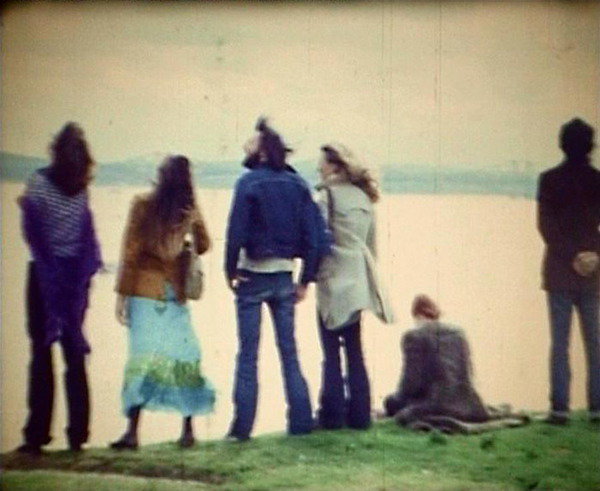Politicization of Friendship
dal 30/6/2014 al 27/9/2014
Segnalato da
Roberto Barandalla
Dario Schvarzstein
Joze Barsi
The Beehive Design Collective
Ivan Cardoso
Juan Downey
La Escuela de Valparaiso
Galeria Chilena
Group Material
Group of Six Artists
Minna Henriksson
Roberto Jacoby
KURS
Milos Miletic
Mirjana Radovanovic
Madness in the Eighties
Anti-Psychiatry Movement in Slovenia
Manga Rosa
Roberto Mardones
Tina Modotti: Farewell to Photography
Andrei Monastirsky (Collective Actions)
Museo de la Solidaridad / Museum of Solidarity
The OHO Group
THE PLAY
Zoran Popovic
The Real Estate Show
Benet Rossell
Skart
Josip Vanista (Gorgona)
Yugoslav Surrealists: Politics of the Impossible
Bojana Piskur
Isabel Garcia Perez de Arce
Andre Mesquita
Miklavz Komelj
Branka Stipancic
30/6/2014
Politicization of Friendship
Museum of Contemporary Art Metelkova MSUM, Ljubljana
The exhibition presents works by artists, art collectives and movements that stem from the following questions: What can friendship achieve? What shifts can occur, in both artistic-formal and political terms, if friendship begins to create new ways of interpersonal relating and new structures of being?

Roberto Barandalla & Darío Schvarzstein, Jože Barši, The Beehive Design Collective, Ivan Cardoso, Juan Downey, La Escuela de Valparaíso, Galeria Chilena, Group Material, Group of Six Artists, Minna Henriksson, Roberto Jacoby, KURS (Miloš Miletić & Mirjana Radovanović), Madness in the Eighties: Anti-Psychiatry Movement in Slovenia, Manga Rosa, Roberto Mardones, Tina Modotti: Farewell to Photography, Andrei Monastirsky (Collective Actions), Museo de la Solidaridad / Museum of Solidarity, Santiago, Chile, The OHO Group, THE PLAY, Zoran Popović, The Real Estate Show, Benet Rossell, Škart, Josip Vaništa (Gorgona), Yugoslav Surrealists: Politics of the Impossible
Curator: Bojana Piškur
Co-curators: Isabel García Pérez de Arce, André Mesquita
Special projects curated by: Miklavž Komelj, Branka Stipančić
In the history of philosophy as well as theory of art there exists a variety of works based on the idea of friendship. The core of present interest in friendship goes beyond friendship as mere closeness, affinity, affection or some consensus of opinion. It implies a broader political dimension and consequently a certain tension and malaise.
The exhibition itself evolved from the premises of so-called participatory art of Eastern Europe and Latin America, which are here brought to a significantly different level. The exhibition Politicization of Friendship therefore attempts to encompass certain aspects of "participation", for instance collective artistic production, solidarity, interaction and collaboration between artists in different parts of the world where the art system was not only underdeveloped, but also completely indifferent towards alternative artistic practices. Some of the typical characteristics of Eastern European and Latin American spaces and their understanding of collectivity and collaboration include informal alternative art spaces, apart-art, art collectives, collective creativity, self-organizing, "self-historicization," etc.
However, our point of departure is not the history of theater or performance art, where theoreticians typically tend to locate the beginnings of participatory art, but primarily ruptures in various areas of knowledge, or "the new politics of knowledge", that have occurred since the 1960s. Such ruptures produced different discourses - not only the discourse on madness, sexuality, history and a variety of scientific discourses, but also the discourse on art. They all derive from an attempt to dispense with the conventional habits of mind and received ideas in each established area, or in other words, from the need to uncover the relations between knowledge and power.
The exhibition presents works by artists, art collectives and movements that stem from the following questions: What can friendship achieve? What shifts can occur, in both artistic-formal and political terms, if friendship begins to create new ways of interpersonal relating and new structures of being? What is at issue is not just the political potential of an artwork or its emancipation from the representational regime, but politicization as desire, which "deploy[s] its forces within the political domain and grow[s] more intense in the process of overturning the established order." In short, desire as the driving force of exploration, which surfaces at some fundamental encounter at the junction of politics, art, philosophy, etc.
Friendship can't simply be equated with collective spirit and collective work; it is a form of emancipation, not in the sense of political correctness, consensus or search for some universal truth, but as a constant discovering of what we are and what we become in the processes of friendship. These questions are both essentially political, calling for a decision that does not come easily, hence demanding a significantly different engagement in the here and now.
Accompanying the exhibition there is a program of lectures and talks, workshops, and screening of buddy film at the Slovenska Kinoteka.
An exhibition catalogue is designed by Škart.
The exhibition is supported by the Ministry of Culture of the Republic of Slovenia.
Image: Zoran Popović, Pretty Good Edinburgh and Surrounding Area, 1973 (film 8 mm, color, silent, 11'20) Courtesy: Zoran Popović
2 July at 6 p.m. “Politicization of Friendship”, a conversation in English with exhibition participants, +MSUM conference room
Museum of Contemporary Art Metelkova (MSUM)
Maistrova 3, SI-1000, Lubiana
Hours:
from 10 am till 6 p.m. Closed on Mondays.
Admission:
adults: 5.00 eur
students, pensioners: 2.50 eur
groups (adults): 3.50 eur
groups (students, pensioners): 2.00 eur
families: 8.0



